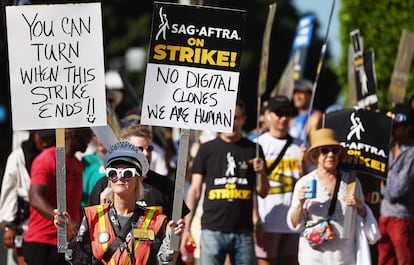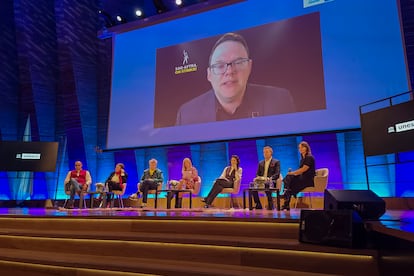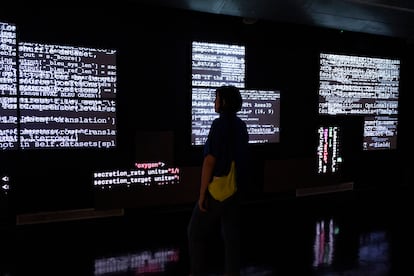Artificial intelligence clashes with copyright: Is it stealing thousands of protected creations?
More and more artists have denounced that this technology is absorbing their works — without authorization — to learn how to imitate them. Meanwhile, the EU is preparing new regulations surrounding AI, as the U.N. held its first conference on the matter

The human brain never stops thinking, even during the most mundane moments of life. But every once in a while, in someone’s head, a special light bulb clicks on.
Years ago, as an example, the mind of George R. R. Martin conceived a story of dragons, ice and betrayal, capable of enchanting millions of readers. This was an idea, a work of art, a talent… culture, essentially. And culture is considered to be so important for a society that it’s vehemently protected with copyright law, so that the creators of this culture are properly credited and compensated. These regulations are also meant to protect — in theory — other individuals from stealing or copying said cultural material. But in practice today, intellectual property faces a colossal threat that legislators of the past couldn’t have imagined: artificial intelligence (AI).
Several artists have complained — either via public statements or through the courts — about the massive theft of their work, so that machines can be trained to imitate creators. Actor Stephen Fry recently shared his indignant astonishment at a documentary that used his voice, with phrases that he had never recorded. Scarlett Johansson has taken legal action against an application that used her image and name for an advertisement, without even asking for her permission.
It turns out that the future –—with all its opportunities and dark clouds — is already here. One of the pillars of the strikes organized by the Writers Guild and the Screen Actors Guild has been the issue of AI. Meanwhile, two weeks ago, UNESCO held its first conference on the impact of AI in the world of cinema. Similarly, the EU is preparing a series of regulations that are scheduled to come into force between 2024 and 2025, which are intended to make this technology fairer, including in the creative field.
A question increasingly hovers over workshops, studios and parliaments: is AI robbing artists of their work?

History, in some way, is repeating itself. In the past, the appearance of the internet drew tens of millions of viewers around the planet, while also offering a world of opportunities to the arts. But, at the same time, the number one public enemy of the last decades emerged as a result: piracy.
This isn’t just about culture. The dangers to the privacy, stability, or even health of citizens is of such concern that President Joe Biden recently resorted to a law from the era of the Korean War (1950-1953) to force technology companies to notify the American government about any advancement that poses a “serious risk to national security.” The dilemmas affect everything from the running of the White House to the day-to-day life of any household. The concerns and complaints in the field of copyright don’t stop multiplying.
“[This widespread occurrence] cannot be described as theft. Generative AI systems draw on pre-existing texts and images to learn to produce their own. If [the materials are] protected by intellectual property rights, their use may require authorization. What the authors are denouncing is that they didn’t give permission [to the AI systems],” explains José María Méndez, a lawyer at Baker McKenzie who’s an expert in the sector. He insists, however, on distinguishing each incident on a case-by-case basis.
David Fuentes Lahoz — a lawyer specializing in intellectual property at Bird & Bird — seconds this. ”The correct thing would be to talk about a potential infringement of intellectual property rights.” This results in an economic benefit only for the companies that own these programs, while the artists don’t even get the crumbs. Both experts also mention another possible risk: that the works generated in such a manner actually represent plagiarism.

Iban García del Blanco — a socialist member of the European Parliament for Spain, who is involved in the preparation of the EU regulations on AI — has spoken about the evasion of the law when it comes to AI. While he acknowledges that this is a matter of interpretation, he has pointed out that the European copyright directive — approved in 2019 — does permit data mining and the use of licensed content without authorization, but only for scientific research and development. García del Blanco has denounced the fact that generative AI often tries to hide under this umbrella term. “We’re facing the exploitation of rights of owners, [via the] use of a standard that wasn’t designed for [this purpose].” He has suggested that the European Commission issue an official clarification on the matter, or even modify the article in question.
At the same time, future EU regulations want to register generative AI systems and require maximum transparency regarding what data they use, how much they use and how they use it. This is key so that creators can claim their piece of the pie — including the one that big tech firms have already eaten.
Brussels is also considering an explicit notice that accompanies any work not created by humans, to distinguish them and avoid deepfakes (modifications made by AI based on videos or real images). Keanu Reeves has thrown credibility to this initiative: the actor is already signing contracts in which he vetoes being subject to digital touch-ups.
There’s also another front in this battle — perhaps the most devilish one. Once trained, the machines are ready to generate their own cultural offerings. And, therefore, they compete with the same artists whose work they have been swallowing up. First they steal the creations… then, they steal the audience.
“They could have used millions of works [that are already available] in the public domain, but they choose to work with the current ones. It’s evident that [these tech companies] want to compete in the market,” García del Blanco sums up. That’s exactly why the Screen Writers’ Guild got the studios to commit to limiting the role of this technology in the writing of movies. The current actors’ strike is also putting forward the proposal to limit the use of AI in the filming of movies.
Companies that want to generate culture through AI may also find themselves facing a specific problem, according to lawyer Fuentes Lahoz: “To speak of copyright, [a creation] must be the result of at least one person. If said [creation] came substantially or exclusively from an artificial intelligence system, copyright protection could hardly be recognized. Hence, the spread of [certain creations] that lack authorial protection could occur.”
“Let’s think about a company that decides to invest millions of [dollars] into a system that creates songs. These [productions] could be free of copyright and, therefore, the company wouldn’t have the right to object to the unauthorized use of said music.”

“There’s something that’s glaringly absent from texts generated by AI: the soul that is born from desires, hope, pain, violence. The machine has none of that… [All you can do] is teach it to simulate [those things],” explains writer Lorenzo Silva. He — along with many other storytellers — aren’t so concerned about competing with works created by AI, which they consider to be “empty.” Rather, they take issue with the use of their books to train these systems.
The novelist Javier Sierra adds: “Perhaps it is easier to copy novels from a genre that follows a structure — such as detective stories or romances — but, in general, books written by AI will cause discomfort in their readers, due to the feeling that they’re always reading the same thing.”
Identity theft, professional replacement and precariousness are all fears that have shaken up the cultural sector. Just look at the number of promotional campaigns that already save on commissioning an illustrator, as the machines draw for free. A movement among photographers is encouraging all professionals to make explicit in each image that they prohibit its use for AI. More and more groups — from the plastic arts to the publishing industry — are loudly demanding compensation and justice.
Obviously, the arts always draw on past influences. For instance, every author recommends reading a lot before facing the blank page. And there’s no filmmaker or musician who hasn’t watched and listened to something before recording. Isn’t AI then a disciple like any other? “These are machines that imitate a certain style through mass reproduction. They can replicate it [in just] a few moments. The future writer who intends to be inspired by George R. R. Martin will at least have had to have [purchased] and read his books,” answers García del Blanco.
“At a legal level, a book or a movie isn’t protected in the same way as other assets, because we consider them to be different [from other products]. We find it acceptable that an author draws on the works of his predecessors to generate his own, because this is the only way in which human creativity can develop. The absence of the human element is what leads us to a different reasoning with AI. [However, this doesn’t stop some parties from] advocating for the protection of works generated by AI through intellectual property rights,” explains attorney José María Méndez.
Does pirating also feed AI?
Generative AI — which has been developing for about seven or eight years now — is fed with all the information available on the web. Through the algorithm used to analyze the codes of websites in search of information, it collects everything: from the images that an illustrator uploads, to products available in the public domain. “[These systems] have fed on data that was available on the internet: they haven’t stolen it or hacked any computer,” explains Jordi Torres, a researcher at the Barcelona Supercomputing Center.
But does this also include data posted illegally? “I couldn’t say if each image or text that is added to these massive databases is reviewed, or if the use [that a company] wants to apply to it complies with the licensing terms of each product,” admits Enzo Ferrante, who holds a doctorate in Computer Science from Paris-Saclay University. Precisely in his legal complaint, George R.R. Martin claims that ChatGPT obtained his A Song of Ice and Fire literary saga from illegal online libraries. EL PAÍS tried unsuccessfully to communicate with the developers of ChatGPT, OpenAI, and Stability to ask about the origins of the information that they feed their large language models (LLMs).
Not everything, however, is bad news. AI also offers a universe of possibilities to the entire planet, creators included. García del Blanco himself is aware of this. “Some cartoonists told me that they’ve stopped wasting time drawing repetitive cartoon backgrounds to be able to concentrate on the creative parts that stimulate them the most and are considered essential. The same [mechanism] can be applied in the audiovisual sector or the music sector.”
“In the history of humanity, whenever a new tool has emerged, it has never been dismissed,” Torres emphasizes. However, he advocates for its democratization through legislation that everyone can participate in drafting. “Let it not just be a few people who do it for us. We have to get closer [to the process], we have to learn from it and not leave it in the hands of a few politicians or engineers,” he affirms.
García del Blanco agrees. “AI is coming to give us a hand. But controls must be established.” It’s all about carefully considering how to regulate and which regulations to ultimately impose. Luckily, human beings never stop thinking.
Sign up for our weekly newsletter to get more English-language news coverage from EL PAÍS USA Edition
Tu suscripción se está usando en otro dispositivo
¿Quieres añadir otro usuario a tu suscripción?
Si continúas leyendo en este dispositivo, no se podrá leer en el otro.
FlechaTu suscripción se está usando en otro dispositivo y solo puedes acceder a EL PAÍS desde un dispositivo a la vez.
Si quieres compartir tu cuenta, cambia tu suscripción a la modalidad Premium, así podrás añadir otro usuario. Cada uno accederá con su propia cuenta de email, lo que os permitirá personalizar vuestra experiencia en EL PAÍS.
¿Tienes una suscripción de empresa? Accede aquí para contratar más cuentas.
En el caso de no saber quién está usando tu cuenta, te recomendamos cambiar tu contraseña aquí.
Si decides continuar compartiendo tu cuenta, este mensaje se mostrará en tu dispositivo y en el de la otra persona que está usando tu cuenta de forma indefinida, afectando a tu experiencia de lectura. Puedes consultar aquí los términos y condiciones de la suscripción digital.








































